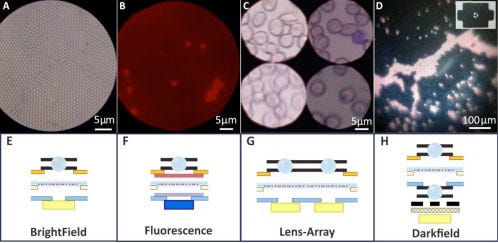Foldscope: The Little Microscope That Could
March 13, 2014
|
Foldscope imaging modalities. |
A folded-paper microscope that could cost less than 50 cents to manufacture in quantity may help in the battle against disease in third-world countries, disaster areas, and other places without the benefit of a clinical laboratory.
At least that is the hope of Manu Prakash, PhD, assistant professor of bioengineering at Stanford University, and a few of his friends. Called the Foldscope, the device can be assembled from a flat sheet of paper and a few components in less than 10 minutes.
And it's said to be good enough to be useful. The team says that "it can provide over 2000× magnification with submicron resolution, weighs less than two nickels, is small enough to fit in a pocket, requires no external power, and can survive being dropped from a 3-story building or stepped on by a person."
A paper, "Foldscope: Origami-based paper microscope,"has been published on the Cornell University Library website. The paper's abstract gives clues to the instrument's sophisticated design, such as,"Flexure mechanisms created via folding enable a flat compact design," and "Structural loops in folded paper provide kinematic constraints as a means for passive self-alignment." The full paper, which includes a Bill of Materials and diagrams, is available as a free PDF download, no registration or anything else required.
)
Prakash told the phys.org website that the team's challenge was to come up with the best possible instrument almost for free. What emerged were "little microscopes built out of paper, tape and glue." Prakash said "They are as good as many research microscopes that you can buy." And the team is still working on improving the device.
These little devices could save lives. Prakash and his team have already shown how their device can image common bacteria and parasites such as Giardia lamblia, Leishmania donovani, Trypanosoma cruzi (Chaga's parasite), Escherichia coli and others. With the right staining and filters, the microscopes could be turned into disease-specific readers.
There's also the potential for education. "Many children around the world have never used a microscope, even in developed countries like the United States," say the scientists. "A universal program providing 'a microscope for every child' could foster deep interest in science at an early age."
Whoever picks up this ball and runs with it, it seems unlikely that we've heard the last of the Foldscope.
Stephen Levy is a contributor to Qmed and MPMN.
About the Author(s)
You May Also Like

.png?width=300&auto=webp&quality=80&disable=upscale)

